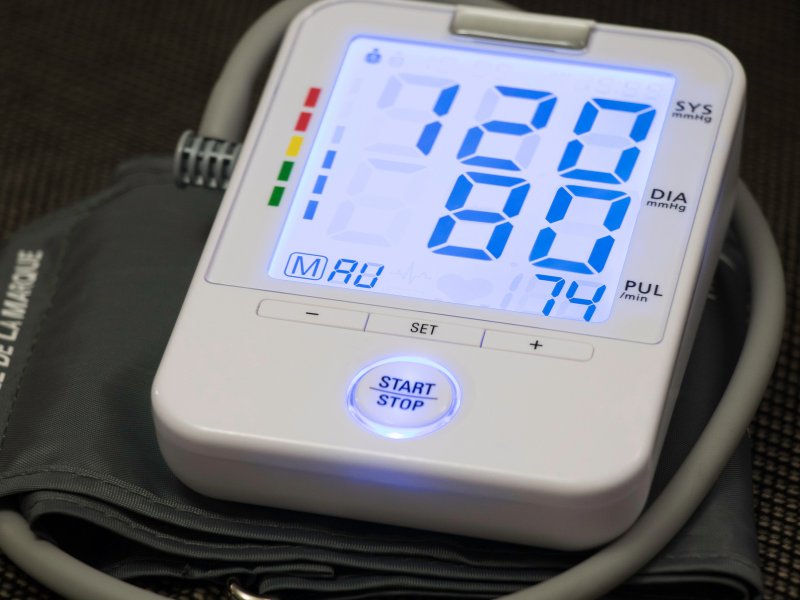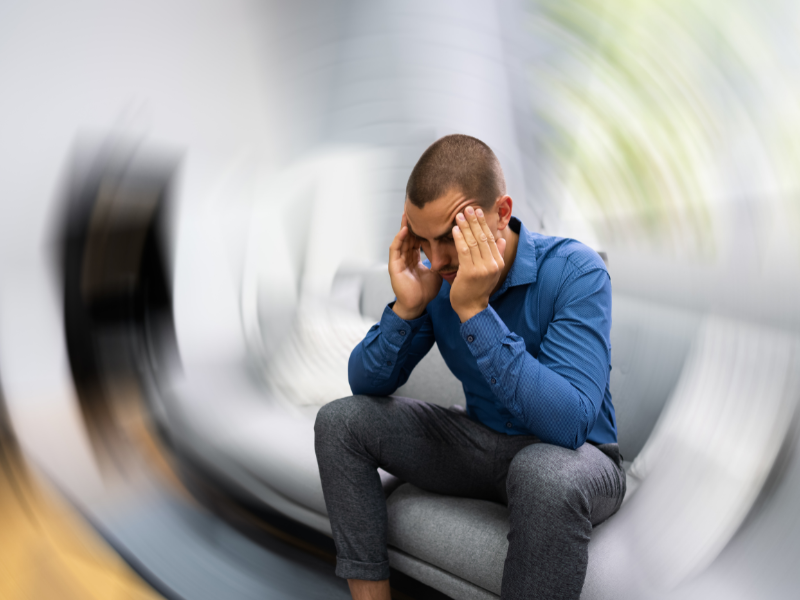


If you often experience dizziness in the morning, you may wonder to yourself, ‘Why am I dizzy when I wake up?’. Morning dizziness can stem from various causes, including dehydration, low blood pressure, or sleep apnea. In this article, we will explore what dizziness is and the 8 reasons for morning dizziness.
Dizziness is a feeling of lightheadedness or the feeling of things being unbalanced. While not a condition on its own, it is often a symptom of an underlying issue.
Dizziness may sometimes accompanied by fainting or seizure, making it risky for elderly people at risk for falls or have health conditions. If you experience dizziness in the morning, it could be due to things such as dehydration, postural hypotension, and more.
In the next section, we will go into further detail on the reasons for morning dizziness.

Morning dizziness can stem from various causes, ranging from underlying medical conditions and medication side effects to the aftermath of a night filled with activities. Here are 8 reasons why you may be experiencing dizziness symptoms in the morning.
Not drinking enough fluids throughout the day could leave you feeling dehydrated and lightheaded when you wake up. Dehydration manifests itself in the following ways: thirst, weariness, headaches, and dry mouth and lips. This sensation is a result of the body’s fluid imbalance, affecting blood volume and subsequently impacting blood pressure.
Drinking adequate fluids is important to avoid symptoms of dehydration. Also, avoid drinking alcohol or caffeine. Too much alcohol and caffeine can cause further dehydration.

Some people experience dizziness due to low blood pressure, or hypotension.
For instance, when someone moves from a lying or sitting position to a standing position too quickly, it may cause them to feel dizzy. This happens because of postural or orthostatic hypotension which is a sudden drop in blood pressure.
Sometimes, low blood pressure can be a result of an existing medical condition such as Parkinson’s disease. Low blood pressure can also be caused by blood pressure medicines like diuretics, and alpha or beta blockers.
Another reason why you may experience morning dizziness could be due to low blood sugar levels. This happens when you don’t have enough glucose circulating in your blood.
Low blood sugar is also common in those with diabetes and requires the use of insulin. Some people may also experience low blood sugar because they are skipping meals frequently, consuming way too much alcohol, or exercising too intensely.
Labyrinthitis is a viral and bacterial infection of the inner ear. Ear infections such as this can cause an inflammation of the structures of the inner ear or labyrinth, affecting balance.
When the person’s balance is affected, it can be hard to stay upright, especially when getting out of bed.
Medication is also another reason why you may feel dizzy in the morning. Some medications may cause dizziness as a side effect. Some common medications that cause this, include:
If you feel that one of the medications that you are taking is constantly causing you to wake up dizzy, consider consulting your doctor for a different medication or treatment option.
See also: Are Your Medications Affecting Sleep At Night?
A study found that dizziness is a common symptom reported by patients who are diagnosed with the sleep disorder, sleep apnea. The results of the study concluded that dizziness may arise when obstructive sleep apnea becomes moderate to severe. At the same time, 27% of participants who had mild sleep apnea had also reported symptoms of dizziness.
The partial or complete cessation of breathing while sleeping at night results in a lack of oxygen to the brain. This may cause you to feel early morning dizziness.
So, if you are feeling dizzy as a result of sleep apnea, it is wise to speak to a sleep doctor to see what could be done.

You may also like: Can You Die From Sleep Apnea?

Vertigo is an inner ear disorder that can cause you to feel a spinning sensation when you move your head. It is not the same as labyrinthitis, an inner ear infection.
Benign paroxysmal positional vertigo (BPPV) is a common cause of vertigo, usually triggered by a change in your head’s position. If you have vertigo, you may experience brief episodes of mild to intense dizziness.
While it doesn’t last for too long each time, you should see a doctor if it becomes too disruptive for you to go about your daily activities.

Last but not least, we have congestive heart failure. Many patients with congestive heart failure have reported feeling a sense of lightheadedness when they get up too quickly.
Congestive heart failure develops due to an underlying condition weakening or stiffening the heart. When this happens, the heart is not able to pump blood efficiently which causes poor blood flow to the brain and the rest of the body [1].
Poor blood circulation to the brain leads to dizziness and disorientation. In more severe cases, it can cause confusion or loss of consciousness.
Therefore, if you feel dizzy the next time you wake up, you may want to consider if any of these 8 reasons are causing that to happen. If it is only a matter of being dehydrated, you want to ensure that you are keeping track of your daily water intake. If the dizziness is related to something more serious, you may want to get it checked out.
You may also like:
Sleep Inertia: Dealing With Morning Grogginess
Circadian Rhythm: What It Is, How It Works And Importance
Sleep Hygiene: 14 Tips For Sleep Better
9 Relaxing Sounds to Sleep Better and Relieve Stress
Dispatch Health (2021) Tips for Managing Dizziness with CHF [online]. Available at: https://www.dispatchhealth.com/blog/tips-for-managing-dizziness-with-chf/
Foster, Carol A.; Machala, Maria. The Clinical Spectrum of Dizziness in Sleep Apnea. Otology & Neurotology 41(10):p 1419-1422, December 2020. | DOI: 10.1097/MAO.0000000000002824